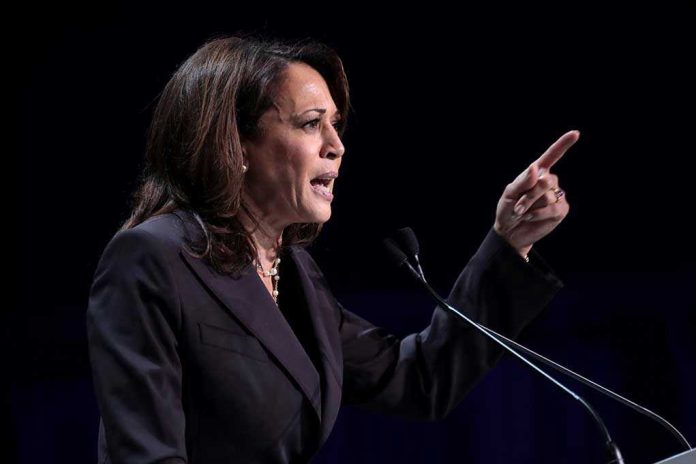
President Trump’s revocation of Kamala Harris’ Secret Service protection has triggered a stunning chain reaction that exposes the deep costs of liberal policies and government waste as California scrambles to protect its failed former vice president.
Story Highlights
- Trump terminated Harris’ extended Secret Service protection on August 29, 2025, forcing California to bear security costs
- LAPD initially stepped in but withdrew protection after public backlash over resource allocation
- California taxpayers now shoulder the burden of protecting Harris through state agencies
- The move highlights executive authority and the financial consequences of Biden-era extensions
Trump Exercises Executive Authority Over Security Resources
President Trump issued an executive memorandum on August 29, 2025, ending former Vice President Kamala Harris’ Secret Service protection effective September 1. The decision terminated an unusual one-year extension granted by former President Biden, which exceeded the standard six-month protection period for former vice presidents. Trump directed Department of Homeland Security Secretary Kristi Noem to implement the revocation, exercising clear executive prerogative over federal security resources.
The timing raises legitimate questions about resource allocation and precedent. While Harris’ supporters cry political retaliation, the reality is that extended protection beyond statutory requirements represents a significant taxpayer expense. The Secret Service faces budget constraints and staffing challenges, making indefinite extensions for former officials fiscally irresponsible. Trump’s decision returns protection policies to their intended scope while forcing California to assume responsibility for its own political figures.
California’s Costly Security Scramble Exposes Liberal Mismanagement
When federal protection ended, California immediately mobilized state resources to fill the gap, with Governor Gavin Newsom approving California Highway Patrol protection for Harris. The LAPD’s Metropolitan Division initially provided security but withdrew after facing intense public criticism about diverting officers from crime prevention to protect a wealthy former politician. This sequence perfectly illustrates the liberal tendency to burden taxpayers with costs that should be private responsibilities.
Los Angeles residents rightfully questioned why their police resources should protect Harris while crime rates remain elevated throughout the city. The LAPD’s retreat demonstrates that even in deep-blue California, citizens recognize the absurdity of prioritizing political elites over public safety. Mayor Karen Bass called Trump’s decision “revenge,” but voters see it as accountability and proper resource management that forces California to pay for its own political figures rather than subsidizing them through federal funds.
Precedent and Constitutional Authority Vindicate Trump’s Decision
Critics attempting to paint this as unprecedented conveniently ignore established law and executive authority. Former vice presidents receive six months of protection by statute, not indefinitely. Biden’s extension was the aberration, not Trump’s enforcement of standard policy. The Constitution grants presidents broad authority over executive agencies, including the Secret Service, making this decision well within presidential prerogatives and established legal framework.
Security experts confirm that revoking extended protection is rare but legally sound. The Secret Service operates under executive direction, and presidents routinely adjust protection details based on threat assessments and resource availability. Harris remains free to hire private security like any other wealthy American, removing the burden from taxpayers who never consented to indefinite protection for failed politicians. This decision restores constitutional order and fiscal responsibility to federal security operations.
Financial Burden Shifts Where It Belongs
The protection transfer highlights a broader principle of federalism and fiscal responsibility that conservatives have long championed. California chose Harris as its senator and supported her vice presidential ambitions, making state-level protection appropriate and fair. Why should taxpayers in Texas, Florida, or Ohio subsidize security for California’s political figures indefinitely? Trump’s decision forces accountability and ensures that states bear costs for their own political investments.
Harris maintains substantial personal wealth and book deal proceeds, providing ample resources for private security arrangements. The notion that taxpayers must indefinitely fund protection for former officials contradicts basic principles of limited government and personal responsibility. California’s assumption of these costs represents proper federalism in action, with state governments handling their own political figures rather than expecting perpetual federal subsidies for their chosen representatives.
Sources:
Fox News: Elite California unit steps up after Kamala Harris Secret Service detail times out
The 19th: Harris Secret Service protection revoked by Trump



